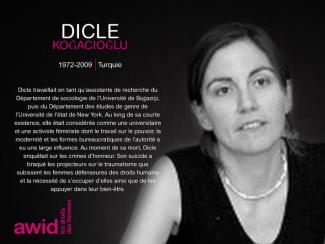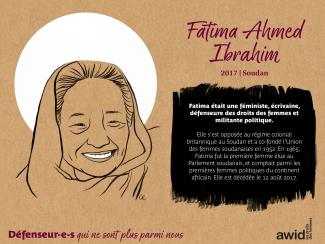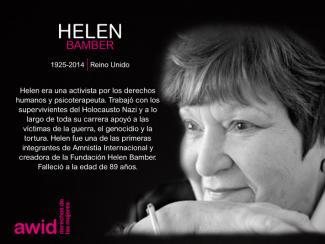
Dicle Kogacioglu

WHRDs are self-identified women and lesbian, bisexual, transgender, queer and intersex (LBTQI) people and others who defend rights and are subject to gender-specific risks and threats due to their human rights work and/or as a direct consequence of their gender identity or sexual orientation.
WHRDs are subject to systematic violence and discrimination due to their identities and unyielding struggles for rights, equality and justice.
The WHRD Program collaborates with international and regional partners as well as the AWID membership to raise awareness about these risks and threats, advocate for feminist and holistic measures of protection and safety, and actively promote a culture of self-care and collective well being in our movements.
WHRDs are exposed to the same types of risks that all other defenders who defend human rights, communities, and the environment face. However, they are also exposed to gender-based violence and gender-specific risks because they challenge existing gender norms within their communities and societies.
We work collaboratively with international and regional networks and our membership
We aim to contribute to a safer world for WHRDs, their families and communities. We believe that action for rights and justice should not put WHRDs at risk; it should be appreciated and celebrated.
Promoting collaboration and coordination among human rights and women’s rights organizations at the international level to strengthen responses concerning safety and wellbeing of WHRDs.
Supporting regional networks of WHRDs and their organizations, such as the Mesoamerican Initiative for WHRDs and the WHRD Middle East and North Africa Coalition, in promoting and strengthening collective action for protection - emphasizing the establishment of solidarity and protection networks, the promotion of self-care, and advocacy and mobilization for the safety of WHRDs;
Increasing the visibility and recognition of WHRDs and their struggles, as well as the risks that they encounter by documenting the attacks that they face, and researching, producing, and disseminating information on their struggles, strategies, and challenges:
Mobilizing urgent responses of international solidarity for WHRDs at risk through our international and regional networks, and our active membership.
Queremos que hagan de este Foro su realidad feminista: un lugar donde puedan habitar un mundo diferente, al que traigan sus victorias, las soluciones que han creado, lo que lxs hace más fuertes, les da esperanza y les permite seguir adelante. Será una reunión diferente de otras a las que hayan asistido antes.
Lxs invitamos a sumarse a nosotrxs para crear juntxs este mundo. Valdrá la pena hacerlo.
Cada Foro tiene un tema que refleja las necesidades de nuestra membresía y movimientos, y que responde a cómo analizamos el contexto del momento.
Hoy en día los fascismos, fundamentalismos, autoritarismos y el poder empresarial sin restricciones están cobrando cada vez más impulso en el mundo. Vemos cómo estas amenazas convergen con los estados para determinar normas, narrativas y políticas públicas, haciendo que se arraigue una cultura de miedo, odio e incitación a la violencia en el discurso público. Los estados en quienes centrábamos nuestra incidencia y nuestras demandas de derechos, muchas veces ya no se sienten responsables y a veces ni siquiera cuentan con el poder necesario para afirmar derechos.
El Foro AWID 2016 estuvo centrado en los Futuros Feministas y en las condiciones necesarias para hacerlos realidad. En ese momento nos resultó claro que para muchos movimientos por la justicia social pensar soluciones estructurales por fuera del sistema actual constituía un verdadero desafío. Una larga experiencia de desigualdad y opresión puede limitar las posibilidades de la imaginación. Pero lo que también escuchamos en aquel momento y continuamos viendo a nuestro alrededor es que los movimientos feministas ya están viviendo y promoviendo realidades y soluciones centradas en los derechos y la justicia a todos los niveles.
Percibimos la urgencia de movilizarnos desde la esperanza y no en búsqueda de un mínimo común denominador - desde una esperanza apoyada en la certeza de que en todo el mundo, aun con sus imperfecciones, hay experiencias y prácticas que personifican formas más justas de existir y que compartiéndolas, fortaleciéndolas y profundizándolas podemos lograr que alcancen una mayor influencia.
No son sueños imposibles sino realidades que ya estamos viviendo. Esta sensación de posibilidad es una chispa que nos lleva a revisar y volver a valorar las dimensiones transformadoras del trabajo que hacemos.
En AWID entendemos las realidades feministas como ejemplos vivientes de los mundos que sabemos que son posibles. Para nosotrxs, estas realidades feministas proclaman y personifican la esperanza y el poder. Las encontramos en todo lo que nos muestra que existen otras formas de vivir, de pensar y de hacer, desde las expresiones cotidianas que se evidencian en cómo nos relacionamos con otrxs hasta los sistemas alternativos de gobernanza y de justicia. Las realidades feministas son formas de resistencia a sistemas de poder como el patriarcado, el capitalismo y la supremacía blanca.
Son propuestas poderosas que nos orientan hacia la idea de lo que es posible y nos muestran cómo los procesos de organización feminista están abriendo caminos hacia la justicia en movimientos y comunidades de todo el mundo.
En una comunidad negra profundamente marginada de Jackson, Mississippi, Cooperation Jackson lleva adelante un experimento de solidaridad y economía cooperativa. Es un plan ambicioso para desarrollar la propiedad comunitaria por fuera de los modos de producción capitalistas
En África Occidental, mujeres campesinas se están resistiendo a la apropiación de tierras y se niegan a aceptar proyectos de industrialización agrícola, afirmando con orgullo que Nosotras Somos la Solución en una campaña que desarrolla soluciones agroecológicas desde las campesinas y sus conocimientos para alimentar a las comunidades y mitigar el cambio climático
En la India, 5000 mujeres se han unido para desarrollar sistemas de soberanía alimentaria desde las comunidades, basados en los conocimientos locales y que incluyen bancos de cereales y semillas
En México, hay mujeres que han creado un sistema económico sin dinero. En El Cambalache todo tiene el mismo valor: las personas intercambian lo que ya no necesitan por objetos que quieren pero también por conocimientos, habilidades y ayuda mutua. El Cambalache está pensado desde los valores antisistema y anticapitalistas de los movimientos sociales locales
En Rojava, el pueblo kurdo está construyendo una democracia sin estado y las mujeres kurdas ofrecen la Ginología como marco de referencia para cuestionar el patriarcado, el capitalismo y el estado, creando sistemas e instituciones para ponerlo en práctica
En el Reino Unido, las Tías de la Agonía Anarca ofrecen un espectáculo con consejos sobre sexo y citas desde una perspectiva feminista, antifascista y anarquista. Rowan y Marijam están recuperando espacios ganados por la derecha ofreciéndole a un público sobre todo masculino la posibilidad de hacer preguntas difíciles sin ser juzgadxs
El Proyecto Veredictos Africanos Feministas redacta y difunde fallos alternativos en casos africanos decisivos sobre una variedad de temas. Este proyecto nace de una práctica jurídica feminista y propositiva para generar veredictos alternativos y feministas como aporte a la jurisprudencia, la práctica jurídica y la toma de decisiones judiciales de la región.
La Cooperativa Usha, también en India, se creó cuando los bancos tradicionales se negaban a atender a las trabajadoras sexuales en Sonagachi. Ellas se organizaron para crear su propia institución financiera que sirviera a sus intereses. La Cooperativa Usha es un banco cooperativo con más de 20 000 trabajadoras sexuales como socias que en solo un año dio préstamos a 7231 trabajadoras sexuales por valor de USD 4.7 millones. Todas las socias son trabajadoras sexuales. Verdaderamente les pertenece a ellas que son quienes toman decisiones sobre la gestión y dirección de la cooperativa, en un ejemplo pionero de cómo personas y comunidades marginalizadas pueden construir poder econòmico en sus propios términos.
En Puerto Rico, un fideicomiso sobre terrenos comunitarios está transformando un asentamiento en un canal contaminado e inundable en una comunidad sostenible. Constituye un nuevo modelo para urbanizar asentamientos sin que se tornen imposible seguir viviendo allí para sus residentes originales.
En muchos países latinoamericanos hay activistas que ofrecen asesoramiento y acompañamiento entre pares para la realización de abortos con pastillas, reivindicando el derecho de las personas gestantes a decidir sobre sus cuerpos y también al conocimiento médico (por razones de seguridad no incluimos vínculos)
Más sobre estos ejes temáticos
Esperamos que el Foro 2020:
Acentúe el poder de las Realidades Feministas, nombrando, celebrando, difundiendo y entusiasmando con experiencias y propuestas que muestran lo que es posible que ocurra y nutren nuestra imaginación colectiva
Llene nuestros reservorios de esperanza y energía que son tan necesarios para el activismo y la resiliencia por los derechos y la justicia
Fortalezca los vínculos, la reciprocidad y la solidaridad entre los diversos movimientos feministas y con otros movimientos por los derechos y la justicia.
El Foro es más que una reunión de cuatro días. Es una estación en un recorrido más largo para fortalecer nuestros movimientos en torno a la noción de Realidades Feministas que ya ha comenzado y que continuará más allá de las fechas del Foro.
En rejoignant l’AWID, vous intégrez l’organisation féministe mondiale, un pouvoir collectif qui se fonde sur la solidarité et puise ses racines dans le travail entre les mouvements.

Ressources en soutien aux mouvements féministes, aux décideur·euse·s et aux allié·e·s pour résister aux tendances antidroits.
¡Sí! En este momento el formulario requiere que se completen los nombres de lxs presentadorxs aun si no están confirmadxs todavía. Entendemos que es probable que se produzcan cambios durante el año.
Nous aspirons à faire du Forum de l’AWID un réel rassemblement mondial, où participeront une gamme diverse de mouvements, de régions et de générations. Dans ce but, l’AWID mobilise des ressources pour un Fonds d’accès limité, qui soutiendra les coûts liés à la participation de certaines personnes au Forum.
Le 14ème Forum international de l’AWID se tiendra du 11 au 14 janvier 2020 à Taipei, à Taïwan.
Pour ce Forum de l’AWID, il n’y aura pas de processus de candidature.

En supplément, l’AWID financera la participation d’environ 100 personnes de la région d’accueil du Forum. Les membres des comités du Forum (Contenu et méthodologie, Accès et Accueil) ainsi que les membres du Groupe de travail des artistes recevront aussi un soutien du Fonds d'accès.
Nous avons listé d’autres options pour financer votre participation au Forum de l’AWID sur cette page qui contient des idées de financement.
"We know everything is against us and there is very little chance to change that. But we believe in intervention and I do think we have a chance and should use it. That’s why we're doing everything we're doing. We're willing to push for things that are unheard of."
Sopo Japaridze to OpenDemocracy
Photo @სოლიდარობის ქსელი / Solidarity Network
Engage with the AWID International Forum - a major global feminist gathering - and have access to special AWID member discounts and enty points for virtual dialogue. Co-created by feminist movements, the Forum is a unique space for deep discussion and imagination where we challenge and strengthen our organizing, where we connect our struggles and feminist realities together.

لغات العمل في جمعية حقوق المرأة في التنمية هي الإنجليزية والفرنسية والإسبانية. ستتم إضافة اللغة التايلاندية كلغة محلية، بالإضافة إلى لغة الإشارة وإجراءات الاتصال الأخرى. يمكن إضافة لغات أخرى إذا سمح التمويل بذلك، لذا تحقق/ي مرة أخرى بانتظام للحصول على التحديثات. نحن نهتم بالعدالة اللغوية وسنحاول تضمين أكبر عدد ممكن من اللغات بقدر ما تسمح به مواردنا. نأمل في خلق فرص متعددة للكثيرين/ات منا للتواجد بلغاتنا والتواصل مع بعضنا البعض.

La cocréation de nos réalités féministes commence par nous-mêmes, et nos façons de nous traiter les un·e·s les autres. Nous nous efforçons de créer et de protéger des espaces qui sécurisent et soutiennent nos communautés, à la fois en ligne et en personne.
Nous envisageons aussi les espaces sécurisés et accueillants, tout comme cocréés, et dont la possession est partagée. Nous attendons de nos membres qu'iels agissent de façon éthique, responsable et cohérente vis-à-vis des valeurs de l’AWID, et qu'iels assument une responsabilité collective pour garantir un environnement de respect mutuel et de solidarité.
Remarque :
L’AWID se réserve le droit de supprimer des commentaires, suspendre ou révoquer l’adhésion de membres en cas de violation des règles de la communauté. Les membres de l’AWID ne sont pas autorisés à représenter l’AWID à titre officiel, sauf mention écrite contraire. Les membres ne peuvent pas utiliser les espaces de l’AWID à des fins de prosélytisme ou de recrutement de membres pour rejoindre une organisation ou une croyance religieuse. Les membres ne peuvent pas utiliser les espaces de l’AWID pour demander des fonds à des fins personnelles, bien que les liens vers des actions de levée de fonds ou des campagnes de mobilisation soit autorisés.
Nos esforzamos por ser transparentes, por utilizar nuestros recursos en forma responsable, por ser equitativxs en nuestras colaboraciones, y por ser responsables e íntegrxs con nuestrxs afiliadxs, contrapartes y donantes, y con los movimientos con los que trabajamos y en los que participamos. Estamos comprometidxs a reflejar nuestras experiencias, a compartir abiertamente nuestrxs aprendizajes, y a esforzarnos por cambiar nuestras prácticas en consecuencia.

يرجى حساب تكاليف السفر إلى بانكوك، والإقامة والبدل اليومي، والتأشيرة، وأي احتياجات خاصة بإمكانية الوصول، والنفقات الطارئة، بالإضافة إلى رسوم التسجيل التي سيتم الإعلان عنها قريبًا. تتراوح أسعار الفنادق في منطقة سوكومفيت في بانكوك ما بين 50 دولارًا أمريكيًا إلى 200 دولار أمريكي في الليلة الواحدة في حالة حجز غرفة مزدوجة.
يحصل أعضاء جمعية حقوق المرأة في التنمية على خصم عند التسجيل، لذلك إذا لم تكن عضوًا/ة بعد، فإننا ندعوك إلى التفكير في أن تصبح عضوًا/ة والانضمام إلى مجتمعنا النسوي العالمي.
